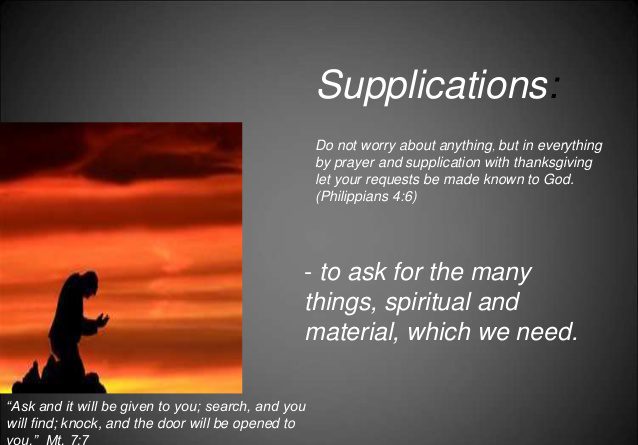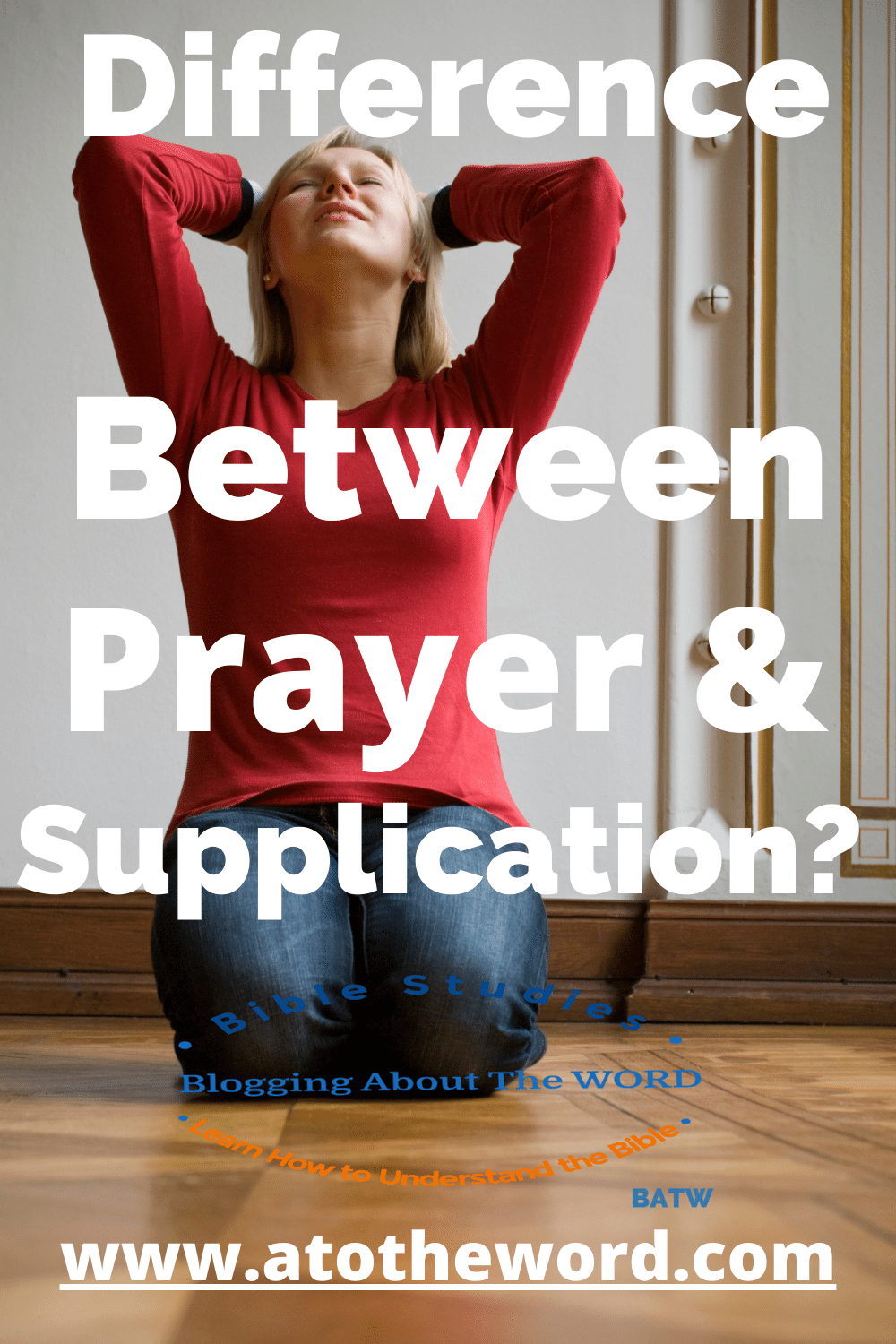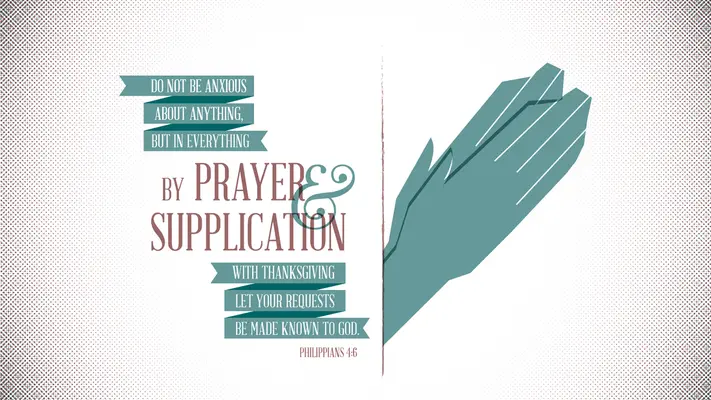What Is The Prayer Of Supplication?
You will not find, the phrase, a prayer of supplication in the Holy Bible. It’s a very emotional petition a Christian makes for another person or for him or herself!
However, there are enough biblical examples of people making prayers of supplication to provide assistance to us in understanding it.
Today, I shall not only explain what is a prayer of supplication, but I shall also highlight the differences between it and just making a petition to the Lord God Almighty.
In this Bible Study, you will discover who makes the most effective supplication prayers and why. Additionally, you will uncover four reasons Christians have for making supplication prayers.
Before we dive right into this, let me define supplication.
What Is The Biblical Meaning of Supplication?
Seeing that I will never find an actual definition of supplication in the Bible, I will define it using my own words.
Thus, here is the biblical meaning of supplication. It’s an emotional request that a Christian makes to the Lord God for self and others or for self only.
If the petitioner requests only for someone else and not for himself or herself such a petition is not a supplication.
Therefore, the Bible is rife with people making supplications (requests) to God.
Daniel explains what it means to make a prayer of supplication to the Lord God.
“Prayer of Supplication Sample”
He informs us: “I set my face unto the Lord God, to seek by prayer and supplications, with fasting, and sackcloth, and ashes”, (Daniel 9:3).
What Is a Prayer of Supplication Or What Is Supplication Prayer?
A prayer of supplication is a petition or a request to God for one’s self.
So, a prayer of supplication is seeking God’s will.
A prayer of supplication is a petition with strong emotions that a Believer in Jesus Christ makes to the Lord God for him or herself and for others or for him or herself only. It’s a very emotional request to God done while praying.
What is an Example of a Prayer of Supplication?
How would you describe Nehemiah’s Prayer? What type of petition was it?
Daniel’s prayer demonstrates a good example of a prayer of supplication
Daniel informs us how he seeks God. He says “by prayer and supplications”; however, note how “prayer” is singular but “supplications” plural.
This is important. It’s crucial because Daniel is praying one prayer but making many requests (supplications) during that prayer for Israel, (Psalm 143:1; Daniel 9:17).
As a result, the Bible describes his petitioning of God for Israel as making “prayer and supplications”, but it doesn’t describe two acts: praying and making supplications, but one. He is making a prayer with supplications (requests).
For example, listen as Solomon makes a prayer of supplication on behalf of himself and Israel.
“Hearken therefore unto the supplications of thy servant, and of thy people Israel, which they shall make toward this place: hear thou from thy dwelling place, even from heaven; and when thou hearest, forgive,” (2 Chronicles 6:21).
Who Makes Prayers of Supplications?
The other night, as I was getting ready for bed, I thought, “Who makes the most effective supplication prayers?”
But the more I thought about this, the more I realize that all the effective supplication prayers, in the Bible, have this one feature in common. Leaders make them!
Of course, this doesn’t mean that if you are not a leader you cannot make an effective prayer of supplication to God. Far from it!
Everyone who prays for others makes supplication prayers, (1 Kings 8:38).
And any Believer could make a request that the Lord God honors. However, supplication prayers are unique. They are most effective when leaders make them.

Three Examples of Prayer of Supplication
They are Daniel, Solomon, and Nehemiah.
Daniel’s Prayer of Supplication
Next, let’s turn our attention to another stalwart petitioner and one the Lord brags about, Daniel.
Daniel recognized that Jerusalem and the Jewish people were distressed by their enemies. Therefore, to secure God’s intervention he made supplications for his sins and the sins of his people before the Lord God.
Consequently, he prays. “And whiles I was speaking, and praying, and confessing my sin and the sin of my people Israel, and presenting my supplication before the LORD my God for the holy mountain of my God,” (Daniel 9:20).
Note above that Daniel, similar to the other leaders before him, made supplication to the Lord God for himself and for his people.
“Yea, whiles I was speaking in prayer, even the man Gabriel, whom I had seen in the vision at the beginning, being caused to fly swiftly, touched me about the time of the evening oblation,” (Daniel 9:21).
And like them, his prayer was focused and he prayed in private.
Solomon’s Prayer of Supplication
Next, let’s inspect Solomon’s supplication prayers. Like Nehemiah, he prayed first for himself then, he prayed for the people. But unlike Nehemiah, the people for whom he prayed were aware of his supplications for them.
They were in his presence as he prayed for them, (1 Kings 8:22). His prayer was very specific also, but he petitioned the Lord for more things, (1 Kings 8:22-59).
Solomon requests of God, “And hearken thou to the supplication of thy servant, and of thy people Israel, when they shall pray toward this place: and hear thou in heaven thy dwelling place: and when thou hearest, forgive,” (1 Kings 8:30).
Again, this prayer of Solomon couldn’t be intercessory for the same reason as for Nehemiah. And this I will explain in the conclusion.
Nehemiah’s Prayer of Supplication
Nehemiah enquired of a fellow Jew concerning some Jews of the captivity that had escaped and of Jerusalem.
However, the response he received saddened him. He wept, fasted, and made supplications for them.
His prayer of supplication is very specific.
He prays: “Let thine ear now be attentive, and thine eyes open, that thou mayest hear the prayer of thy servant, which I pray before thee now, day and night, for the children of Israel thy servants, and confess the sins of the children of Israel, which we have sinned against thee: both I and my father’s house have sinned,” (Nehemiah 1:6).
As a result, Nehemiah prayed first for himself, then he prayed for his nation. In other words, he made supplications for himself and his people.
This prayer couldn’t be intercessory for the reason stated later in this Bible Study.
Additionally, the Jewish people, on a whole, were unaware of Nehemiah’s supplication of prayer. He did all this in private.
Could Anyone Make a Prayer of Supplication?
However, any Believer could effectively make a prayer of supplication to the Lord for another person or persons.
Nevertheless, we could make supplications to God and not cry. But we cannot make any prayer of supplication to Him without emotions because our hearts are always involved.
This is not our physical heart in our chest, but the one in our head, that is our spirit.
We only commence praying when our words start to flow from our hearts (spirits) and it is not possible for any emissions from them without emotions.
And for this reason, I think that written prayers are nonsense. They never worked and our hearts could never enter into them!
Consequently, I recommend that you never use written prayers. Pray from your hearts.
Pray for the Leaders of Your Country
Fathers, you are the leaders and priests of God in your homes. Make supplications prayers for yourself, your family, and your country.
Pastors, you are leaders appointed by the Lord. Pray not only for your congregations but also for the leaders of your country. Pray for your heads of government. And don’t forget all the others in authority.
Pray for your leader, your President, or your Prime Minister.
And because of your role, as a leader, the Lord will hear and honor your petitions which come from a broken and contrite heart.
He did it for those men above and he will do it for you; therefore, start making supplication prayers for others today.
Because of Nehemiah and Daniel’s prayers of supplications, the Lord intervened on Israel’s behalf.
Similarly, owing to Solomon’s supplication prayers, today, thousands of years after his prayer, the Jewish people still pray towards the Sanctuary. God heard and approved his petitions.
Leaders, what cause are you petitioning the Lord God for on behalf of others?
If God Honors our Leader He Honors Us
Supplication prayers are most effective when leaders make them because the Lord God honors or dishonors the (king) or leader first before his people.
If He honors our President, He will honor us. There are no people that God accepts but rejects its leader.
For example, he rejected Pharaoh. Consequently, he rejected all the Egyptians.
Similarly, the Lord rejected King Amalek and all his people. Finally, the King of Jericho and his people suffered because God rejected his leadership.
With this in mind, can you perceive the eminent importance of a person who fears the Lord God as the leader of a country? Or in government?
Consequently, the Lord supplies the reason, in the Scripture below.
“I exhort therefore, that, first of all, supplications, prayers, intercessions, and giving of thanks, be made for all men,” (1 Timothy 2:1).
Supplication prayers are most effective when leaders make them because they usually are petitions to God for changes concerning a people.
“For kings, and for all that are in authority; that we may lead a quiet and peaceable life in all godliness and honesty,” (1 Timothy 2:2).
So for these reasons and others let’s make supplication prayers for our 45th President, Donald Trump.
A Prayer is Not a Request For This!
Contrary to what many non-believers may think, a prayer, or any prayer, is not a request to God for a favor or help.
When we pray we do so knowing that God will grant all our requests, but we just need to believe in Him.
This really means to believe that whatever we are asking (making supplications) for the Lord has already given it to us, (Matthew 21:22).
Any Believer, who doesn’t receive what he or she prays for, never believed that he or she would receive the subject of the prayer.
We receive what we pray for at the time of prayer. Not later but right there on our knees while praying!
This one feature differentiates Believers from so-called Christians! Believe the Word!!
So, making a prayer of supplication means making an emotional request to God for yourself and or for others!
What Is The Main Difference Between a Prayer And Supplication?
In his case, Solomon was making a prayer of supplication for himself and his nation, the Jews. First, he requests that the Lord “hears” his petition.
Second, he also asks Him to hear or “harken” or listen to Israel’s prayer too. But he was petitioning the Lord to “hear” and “forgive” Israel when they shall pray towards the Sanctuary.
He is making supplications, or requests of God to accept the prayers of the Israelites when they shall pray towards His House.
Therefore, making supplications is also praying. But it’s who is praying and for whom that differentiates a prayer of supplication from mere praying or from intercession.
Major Differences Between a Prayer and a Supplication
- We could only make one petition (prayer) to the Lord God at a time but we could make one or many supplications in one prayer.
- Every prayer is a petition but a supplication (request) by itself is not a prayer.
- A prayer doesn’t have to be a supplication but we must make every supplication within a prayer.
- A prayer is more general but a supplication is very specific. Housing is general but a condominium is a specific type of housing.
“difference between supplication and petition”

All Prayers of Supplication Contain These
“difference between supplication and prayer”
However, there is another important distinction between supplications and prayers.
So, when a person offers a prayer of supplication it’s for self or another but usually without the knowledge of the other person. But it’s mostly done with great emotions.
Therefore, we read of tears, crying, weeping, or mourning while a person makes supplications for oneself or others.
Jeremiah, the Weeping Prophet of God, says it best.
He informs, “A voice was heard upon the high places, weeping and supplications of the children of Israel: for they have perverted their way, and they have forgotten the Lord their God,” (Jeremiah 3:21).
And he explains it again for he says:
“They shall come with weeping, and with supplications will I lead them: I will cause them to walk by the rivers of waters in a straight way, wherein they shall not stumble: for I am a father to Israel, and Ephraim is my firstborn,” (Jeremiah 3:19).
How Supplication Prayers Differ From Intercessory Prayers
You may have observed that all these men who made effective supplication prayers were leaders. And as they prayed, first they prayed for themselves, then they petitioned the Lord God, mainly on behalf of their nations, or for others.
And for that reason, supplications are more emotional than any other type of prayer. So we observe leaders making effective supplication prayers as they weep and cry before God, (Ezra 10:1).
These leaders had their country’s interests and well-being at heart.
They poured out their hearts to God for their people and He heard and answered them.
This does not make this an intercessory prayer. When one is making an intercessory prayer such a one doesn’t pray for self.
And for this reason, neither Daniel, Nehemiah, nor Solomon’s prayer, listed above, was making intercessory prayer.
Therefore, to effect the change we need, we should desire that all our leaders make supplications and prayers for others.
And a prayer of thanksgiving is totally different!
Other Examples of Supplication Prayers in The Bible
Jesus Makes an Emotional Appeal
Lest you may think that making prayers of supplication only occurred in the Old Testament (OT), let’s listen as the New Testament (NT) describes Jesus making requests.
“Who in the days of his flesh, when he had offered up prayers and supplications with strong crying and tears unto him that was able to save him from death, and was heard in that he feared,” (Hebrews 5:7).
So, a person making a prayer of supplication is praying for oneself or praying for someone else. Sometimes even a nation.
Apostle Paul And Supplications
Apostle Paul implores Timothy, his young protégé, “I exhort therefore, that, first of all, supplications, prayers, intercessions, and giving of thanks, be made for all men” (1 Timothy 2:1).
I want to point out an important consideration here. Apostle Paul encourages young Pastor Timothy (and us) to make these four types of prayers for everyone.
Thus, whether we make “supplications, prayers, intercessions“, or “giving of thanks“, we make them for “all men” and all women and for ourselves (1 Timothy 2:1).
Pray for others. But they also differ from intercessions.
Below, listen as David makes a single petition with a single request.
“The Lord hath heard my supplication; the Lord will receive my prayer” (Psalm 6:9).

Why is a Prayer of Supplication Important to Christians?
Four Reasons for Making Supplications of the Lord
The Bible uses supplication in the following four contexts: supplications, prayer and supplications, prayer and supplication, and prayers and supplications.
“Be careful for nothing; but in [everything] by prayer and supplication with thanksgiving let your requests be made known unto God” (Philippians 4:6).
Supplication is not so much a prayer as a constituent of every prayer. Every Christian petition should consist of supplication, prayer, intercession, and giving of thanks, (1 Timothy 2:1).
However, here are four reasons for making supplications to the Lord God.
- If we don’t ask we will not receive
- Ask before we are in need
- Petitioning God now ensures receiving later, and
- God desires us to ask of Him
Supplication – If We Don’t Ask Him We Will Not Receive
One of the first motivations for making supplications to the Lord God is to ensure that we will be receiving from Him.
In this context, making supplication is a principle. It’s a rule! If we don’t ask God for the “good things” that we need, we will not receive them (Matthew 7:11).
Therefore, Jesus teaches us, “Ask, and it shall be given you” “For every one that asketh receiveth” (Matthew 7:7-8).
Then, he shows how different he’s from our earthly fathers.
For he informs us, “If ye then, being evil, know how to give good gifts unto your children, how much more shall your Father which is in heaven give good things to them that ask him?” (Matthew 7:11).
So, whatever good things that you desire of the Lord, ask Him for them now and you will receive them. But, if you never ask Him you will not receive anything from Him.
Speak the Word Now – The Word Went Out For Jesus
For example, let’s see how this principle works for Jesus Christ. Centuries before his natural birth someone petitioned the Lord God on his behalf.
Speaking through King David, the Spirit of Christ made supplication for Jesus Christ. He promised:
“I will declare thy name unto my brethren: in the midst of the congregation will I praise thee” (Psalms 22:22).
Note how this works. This was David praying. However, he wasn’t making supplication for himself but for Jesus Christ and for a future event.
We know that the Lord heard and answered David’s supplication. Scriptures declared what Jesus said in the verse following.
Asking Before We Are in Need – Supplication
He says, “I have manifested thy name unto the men which thou gavest me out of the world: thine they were, and thou gavest them me; and they have kept thy word” (John 17:6).
It explains that Jesus Christ revealed the name of the Lord God to his Twelve Leaders. His Twelve Apostles.
Even up to today, only those to whom the Holy Ghost has “manifested” the name of the Lord really know it.
Here is another example of Jesus Christ.
Years before his crucifixion, King David, again made a petition to the Lord God concerning his crucifixion and his soul.
The following is the supplication he made to the Lord for Jesus Christ,
“For thou wilt not leave my soul in hell; neither wilt thou suffer thine Holy One to see corruption” (Psalm 16:10).
Because David asked the Lord for help with these two things concerning Jesus Christ, millennia later, when he needed assistance, the Lord helped him.
A Christian’s Request of God
“prayers and supplications meaning”
Apostle Luke explains this in the following Scripture.
“For David speaketh concerning [Jesus says], I foresaw the Lord always before my face, for he is on my right hand, that I should not be moved” (Acts 2:25).
“Therefore did my heart rejoice, and my tongue was glad; moreover also my flesh shall rest in hope” (Acts 2:26).
“Because thou wilt not leave my soul in hell, neither wilt thou suffer thine Holy One to see corruption” (Acts 2:27).
Many Don’t Have Because They Never Asked
“[You] lust, and have not: [you] kill, and desire to have, and cannot obtain: [you] fight and war, yet [you] have not, because [you] ask not” (James 4:2).
If from pure hearts we make petitions to the Lord for the good things that we desire, we will have them. Consequently, we will not make supplications based on lust.
So, we observe, that because the Spirit of Christ asked the Lord to aid Jesus Christ, He did. If we don’t ask Him we will not receive from Him.
Therefore, as we pray now, we should petition the Lord for the good things that we desire to have later in our lives.
Here’s the final example with the Spirit of Christ asking for the Lord’s assistance for Jesus Christ.
“Have mercy upon me, O LORD; for I am weak: O LORD, heal me; for my bones are vexed” (Psalm 6:2).
Again, this was King David making this supplication to God but not for himself, but for Jesus Christ. You may ask, When was Jesus ever weak?
Immediately after his long-fasting Jesus was very weak. Therefore, the Lord had to dispatch two angels to “strengthen” him.
“Then the devil leaveth him, and, behold, angels came and ministered unto him” (Matthew 4:11; Mark 1:13).
Make Supplications to God Before You Need Him
Again, let’s look at how supplication made for Christ benefited him much later.
Returning to King David, as the Spirit of Christ prayed through him, he asked the Lord to assist him long before he needed assistance and the Lord heard and aided him.
“But be not thou far from me, O Lord: O my strength, haste thee to help me” (Psalm 22:19).
Did the Lord ‘help” him? Yes, He did. First, the Lord dispatched angels to assist Jesus. He was at the end of his long fasting and at the end of his temptation by the Devil. He was very weak from a lack of food and drinks.
Therefore, He sends two angels to strengthen him.
Second, listen as he prays.
“Deliver my soul from the sword; my darling from the power of the dog” (Psalm 22:20).
And,
“Save me from the lion’s mouth: for thou hast heard me from the horns of the unicorns” (Psalm 22:21).
God Desires us to Make Supplications to Him
The Lord is waiting on us to make supplications to Him while praying. Therefore, Jesus teaches his disciples and us,
“And all things, whatsoever ye shall ask in prayer, believing, ye shall receive” (Matthew 21:22).
Here we have a promise of God. He promised to give us the things we asked Him for in prayer if we believed in Him for them.
Even heathens and unbelievers know that they must make a petition to a god or man if they need him to act for them.
Learn from their conversation below.
“All the presidents of the kingdom, the governors, and the princes, the counsellors, and the captains, have consulted together to establish a royal statute and to make a firm decree, that whosoever shall ask a petition of any God or man for thirty days, save of thee, O king, he shall be cast into the den of lions” (Daniel 6:7).
It’s great to possess a desire for something but we must ask God for his intervention before we need it.
FAQs – What Is The Difference Between Prayer And Supplication?
What is the main difference between prayer and supplication?
A prayer is any emission from our hearts to the Lord God but a supplication is always a request. Nevertheless, all prayers are not supplications for there are three other main categories of prayer.
What Is Supplication Prayer?
It’s a petition that you make to the Lord God for yourself and others. So, anytime you pray for yourself and others, in one prayer, you are making a supplication prayer.
“supplication prayer meaning”
Supplication Prayer – FAQs
What Is a Supplication Prayer Example?
Daniel 6:11 has a lovely picture of him making a supplication prayer to God!
Definition of a Prayer of Supplication
Since the Bible uses “supplication(s)” in multiple contexts exercise care when you utilize this word. Don’t use it in a general way but make full use of it using the Bible as your guide.
Asking is one of the few things we can do as we pray. Making a supplication prayer is asking God to act on our behalf and or the behalf of someone and sometimes even on the behalf of a nation.
Who makes supplication prayers? Any Believer could make supplication prayers but a leader makes the most effective ones because of his or her position.
Why should we make supplication prayers? I discussed four reasons in this Bible Study. To recap, if we don’t ask we will not receive, ask before we have a need, petitioning God now provides for later, and finally God desires us to ask of Him.
King David, by the Spirit of Christ Jesus, made a supplication to the Lord God for Jesus Christ. He requested assistance for him, long, long before he needed it, and when he was in need because of David’s petition for him God helped him.
The reason asking God for good things always works: Supplication to Him demonstrates worship of Him.
This is the ultimate posture of a child who knows that his or her Father gives good gifts. And that He always honors His Words.
Additionally, we are aware that His Word always achieves its spoken objective.
Therefore, we should speak the Words of God in prayers and conversations now.
This empowers these Words to supply our good desires later, (Isaiah 55:11).
Making a Prayer of Supplication Now Guarantees Receiving Later
So, making supplications to the Lord now, ensure that He will grant your requests later. Many Christians never receive their hearts’ desires because they never ask.
Other Believers never receive them because they failed to believe their own words in prayer.
Generalization of it will only lead to more confusion and misinformation in the Church of Jesus Christ.
Asking the Lord God for what we need solves our problems. It spiritually and scripturally supplies the Lord with reason to provide us with what we desire of Him in prayer.
Therefore, think about some good things that you desire the Lord God to give you later, but make your petition to Him for them now.
By speaking the words of God now, we are ensuring that they will return and accomplish our good desires later.
What have you made supplication to the Lord for and received it?
So, speak that word now as you make your prayer of supplication to the Lord Jesus!!
On many occasions, the person making the request of God is a leader. We observe this with Solomon, Daniel, Esther, and with Jesus Christ.
Queen Esther understands this and she executes it flawlessly.
“Also he gave him the copy of the writing of the decree that was given at Shushan to destroy them, to shew it unto Esther, and to declare it unto her, and to charge her that she should go in unto the king, to make supplication unto him, and to make request before him for her people” (Esther 4:8).
The Bible states,
“The sacrifices of God are a broken spirit: a broken and a contrite heart, O God, thou wilt not despise,” (Psalm 51:17).
Praying and making supplications from a broken spirit ensures that God hears us.
Have you made a prayer of supplication to the Lord God? Do you know how to make one?
Let me know in the comments below.




Wow! Thank you so much. I was so blessed reading this article
I now understand what supplication prayer truly means.
God bless..
Thank you, Adeola and I’m truly happy to help you understand better God’s holy Words!
Thank you, now I know what the Bible says about a prayer of supplication!